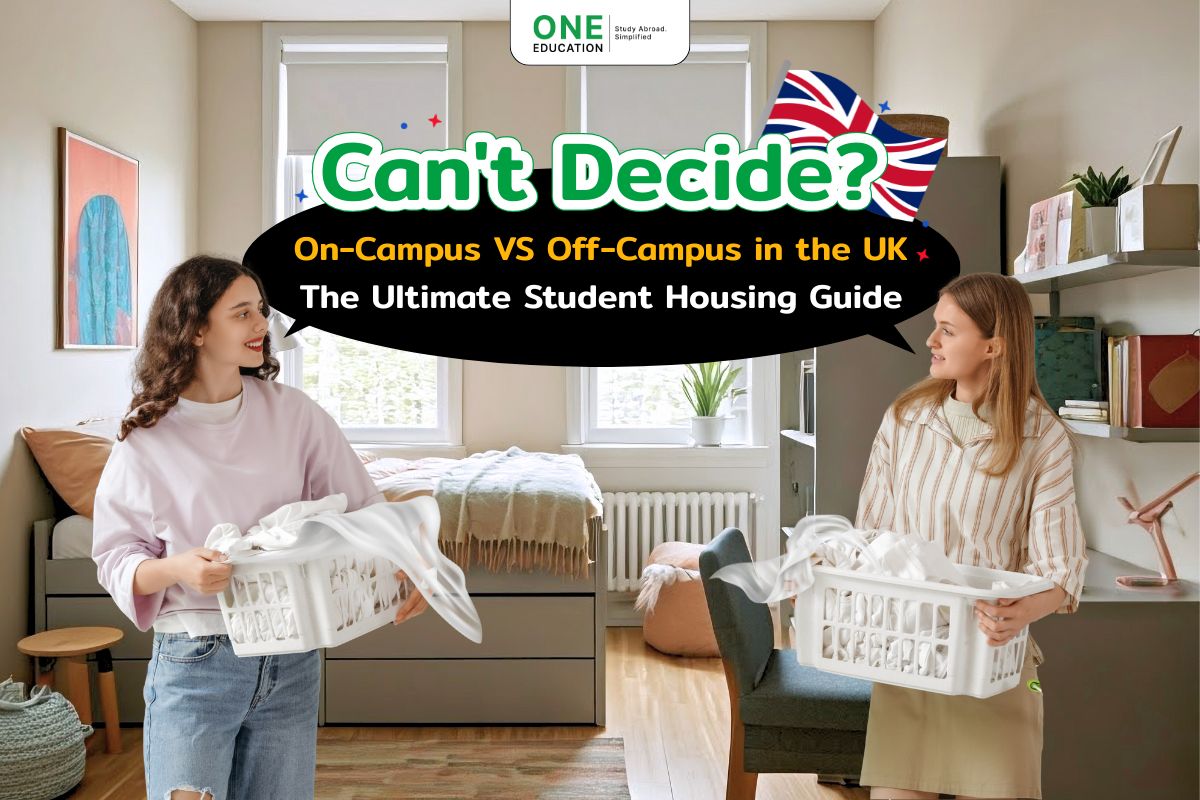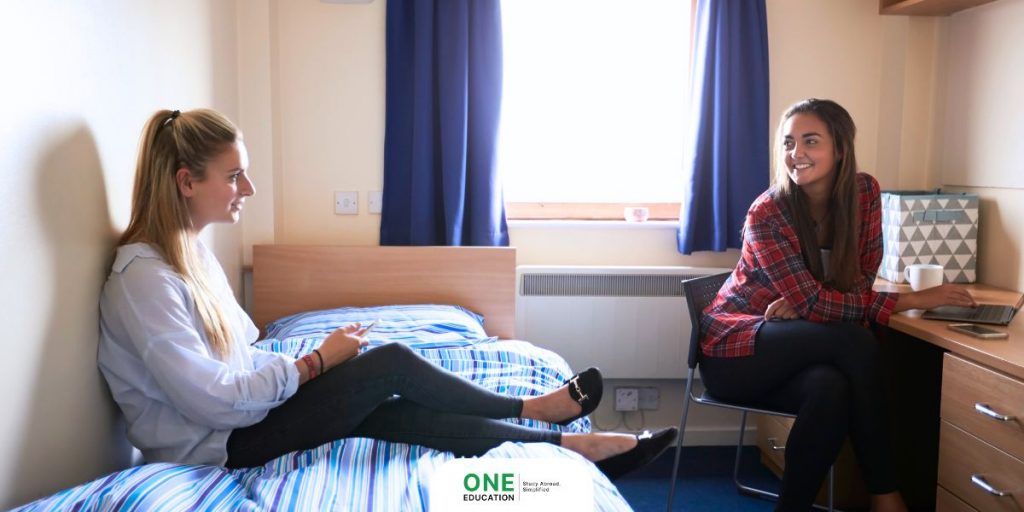On-Campus VS Off-Campus Accommodation in the UK: The Ultimate Student Housing Guide

- Study UK Tips | Study UK Tips
- October 15, 2025
- One Education
After you’ve accepted your university offer, one of the most important next steps is choosing your student accommodation.
Why is booking your accommodation so important?
Don’t forget! Your student accommodation is more than just a place to sleep – it’s where you’ll eat, live, and spend most of your time before and after university every single day. And it’s not a short stay either: in the UK, most student accommodation contracts run for at least 44 weeks.
That’s why choosing the right option is crucial. Unlike in Thailand, cancelling a student accommodation contract in the UK isn’t as simple as giving one or two months’ notice.
When you book, you’ll sign a legally binding contract and follow the provider’s payment schedule. If you later want to cancel, you’ll usually need to find a replacement tenant to take over your contract. Refunds are rare, and if no one takes your place, you’ll still be responsible for the full payment — even if you’ve already moved out.
Accommodation providers in the UK take contracts seriously. If a student withdraws mid-year, the provider loses the chance to re-rent that space, since most students book only during the main intake period. That’s why these rules are strictly enforced.

Which Type of Student Accommodation Should You Choose?
Student accommodation in the UK generally falls into two main categories:
- On-campus accommodation – managed directly by the university.
- Private accommodation (often called off-campus) – residences run by private companies.
Both options are designed specifically for students, so whichever you choose, you’ll be living in a student-friendly environment.
For students heading to the UK for the first time, we usually recommend starting with student accommodation (whether on-campus or private). It’s the most convenient choice for new international students – utilities such as water, electricity, and internet are typically included, and your room is guaranteed from the day you arrive, giving you peace of mind.
If you’re considering private off-campus options, our One Education advisors can help with that too. We work with trusted accommodation partners who will provide you with a list of available properties – all student-friendly and located close to universities.
🟢 Interested in studying in the UK? Get in touch with One Education for personalized advice and support throughout the entire application process. We’re here to help every step of the way! Add Line: @one-edu or submit an enquiry form
Pros of Living in Private Accommodation (Off-Campus)
- High level of personal choice: You can choose almost everything according to your preference from room types like En-suite or Studio, to sharing preferences like female-only or mixed-gender flatmates, whether you want a room with a window or not, and more. Of course, this depends on availability at your chosen accommodation.
- Modern and clean facilities: Private accommodations are usually well-maintained, clean, and up-to-date. In the UK, there are regulations requiring regular renovations to ensure safety and quality, so these properties are generally in good condition.
- Plenty of location options: Especially in larger cities, private accommodations are everywhere, built to meet the growing number of students. Whether you want to stay close to the city center or near campus, you’ll likely have multiple options to choose from.
- Support from official agents (at no extra cost): Many private accommodations have authorized agents who help manage your booking, explain contract terms, and even communicate with the accommodation provider on your behalf if any issues arise, a huge plus if you’re not fully confident in your English. Importantly, there are no extra fees, you’ll pay the same price listed on the accommodation’s official website.
- Flexible check-in options: Many contracts start a week or more before the term begins, giving you time to settle in, adjust to your new environment, and set up your room. If your flight arrives outside of office hours, you can simply notify the accommodation in advance and someone will be arranged to give you your room key, which is very convenient!
Cons of Living in Private Accommodation
Potentially higher cost: Private accommodation can be more expensive than on-campus housing, especially in popular or central locations. If you’re on a tight budget, this might not be ideal. However, it’s not always more expensive in some cities, private accommodation may even be cheaper than university housing. It really depends on the location and the provider.
🟢 Interested in studying in the UK? Get in touch with One Education for personalized advice and support throughout the entire application process. We’re here to help every step of the way! Add Line: @one-edu or submit an enquiry form
Pros of Living in On-Campus Accommodation
- Managed directly by the university: All bookings and arrangements are handled through the university, making the process simple and trustworthy.
- Generally, more affordable: In many cases, on-campus accommodation is less expensive compared to private housing. Universities often provide reasonably priced options that suit student budgets.
- Great location: Most university halls are located on or near campus, which makes getting to classes easy and quick. This is a major convenience, especially for first-year students who are still adjusting to their new environment.
Cons of Living in On-Campus Accommodation
- Limited control over room selection: University accommodations often operate on an allocation system, meaning you may not get your preferred room type, it depends on availability and university placement.
- Longer wait times for confirmation: Since everything is managed by the university, there is a set timeline for applications and results. In many cases, you may not find out whether you’ve secured a room until just before the term starts.
- Students must book the room themselves: The university will give you access to a student portal, and you’ll need to log in and complete the booking yourself. The system usually requires personal details, so the university recommends students manage this step directly.
- Limited early check-in options: Most university-managed halls only allow check-in a few days before the term begins, leaving students less time to settle in or adjust before classes start.
No matter which option you choose, the team at One Education is here to support and guide you through the process. Our services are 100% free, and we’re happy to help you make your study abroad journey smoother, every step of the way.
Interested in Studying in the UK?
For more information and assistance with the application process, you can contact One Education, an official representative of UK Universities. We offer free consultation and support throughout your application journey.
Add our Line official account: @one-edu
Submit an enquiry form. We will get back to you as soon as possible.
Call us: 02-652-0718
One Education | Study Abroad. Simplified
Follow Us
Facebook: One Education
Instagram: oneeducationthailand
Twitter: One Education
TikTok: oneeducationthailand
YouTube: One Education
Latest Blogs
You’re Not Alone Abroad: The Student Support Services You Need to Know Psychology Conversion Courses in the UK Recommended 5 Universities to Study a Master’s in FinTech in Australia Must-Have Apps for Students in Australia! Download Before You Fly Want to Change Your Study Path? Conversion Courses in the UK ExplainedCategories
Student Diary
Study UK Tips
Study Australia Tips
Popular Courses
Scholarships
English Promotions




